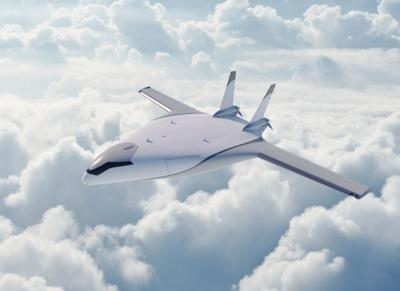Pushing to Eradicate Human Pilots
Founded in 2016 by former Piper lead aerodynamicist Aleksey Matyushev and aerospace engineer Anatoly Star, Natilus is a San Diego, California-based designer and builder of autonomous cargo aircraft. The company plans to fly a full-scale prototype of its Blended-Wing-Body (BWB) concept in 2024.

On 19 April 2023, Natilus announced it had successfully completed multiple flights of a subscale prototype of its Kona regional aircraft. By dint of a protracted series of wind-tunnel tests undertaken for purpose of assessing the aerodynamic performance of Natilus’s unique Blended-Wing-Body (BWB) architecture, the company has drawn one tangible step nearer its objective or doing wholly away with the piloting profession—for humans, anyway.
The subscale prototype of the Natilus’s Kona aircraft took-off from a private runway in Southern California and reached speeds of 61-knots. To date, stability has been among the key challenges of the BWB design; the test flights, however, established that Nautilus’s BWB aircraft configuration is capable of flying in the absence of complex autopilot systems.
Natilus co-founder and CEO Aleksey Matyushev stated: “We are fully focused on completing the full-scale Kona prototype. Our Kona remotely piloted aircraft will be capable of carrying over nine-thousand pounds of freight and will open new markets worldwide. The progress of Natilus developing autonomous cargo aircraft is a game-changer in the logistics industry, providing an efficient and cost-effective solution for shipping goods across oceans.”
In addition to vetting its BWB prototype, Natilus recently completed construction of the full-scale prototypes of Kona’s twin vertical tails, thereby underscoring the aggressive timetable by which Matyushev and company seek to proceed to first flight. Natilus is slated to take May 2023 delivery of the Hartzell propellers by which its Kona model is to be powered. The propellers’ arrival will herald the imminence of static testing of Kona’s powertrain.
Natilus is among a number of companies in the vanguard of the air transport industry's ongoing efforts to do away with human pilots under-cover of the widely held, widely disputed pilot shortage mythos. Notwithstanding empirically verifiable assertions by both the FAA and ALPA that extant pilot-training institutions and aviator talent pipelines will continue to supply the aviation industry with ample numbers of qualified pilots, airlines and concerns such as Natilus and Merlin Labs are working with diligence, determination, and billions of dollars of commitments from the private, government, and military sectors.
Natilus claims its products will allow air freight operators to “scale their operations without compromising safety or efficiency”—an artful euphemism for “Not have to hire, train, or pay pilots.”
Presently, Natilus intends to offer three iterations of its autonomous cargo aircraft: the Kona, a short-haul feeder UAV with a 3.8-metric-ton maximum payload; the Alisio, a medium/long-range UAV with a sixty-metric-ton maximum payload; and the Nordes, a long-range cargo UAV with a one-hundred-metric-ton payload.
To date, Natilus has logged north of $6.8-billion in order commitments and 460+ aircraft pre-orders from major airlines and supply-chain integrators the likes of Volatus Aerospace, Flexport, Astral, Aurora International, and Dymond.
Nautilus posits the extant, $5-trillion global supply chain is in crisis, and sets forth that its aircraft represent a turnkey fix for such.
On 26 January 2023, Nautilus announced that Ameriflight—the DFW-based cargo airline and largest FAA Part 135 cargo air-carrier—had signed a purchase agreement valued at $134-million for twenty of Natilus’s Kona feeder aircraft.

Natilus aircraft are designed to be remotely piloted by licensed UAV operators—a workforce with no unions and no historical pay-scale or compensation structure.
Natilus asserts its carbon fiber, Blended-Wing-Body cargo aircraft can be operated at only forty-percent of the cost of comparably-sized conventional cargo aircraft. The BWB design’s efficiency derives of its twenty-percent drag-reduction over orthodox fixed-wing architectures and one-hundred-percent reduction in onboard crewing.
Unlike myriad UAV start-ups, Natilus has eschewed electric powerplants in favor of conventional turboprop engines—a decision Mr. Matyushev attributes to the paucities of range and power characteristic of current aircraft electric propulsion schemes.
“Electrification is great, but not at the range and payloads we’re talking about,” Matyushev set forth. “We don’t want to carry one pound of cargo and all batteries. It just doesn’t make a lot of sense; that technology is still not quite there yet for the routes that our customers are most interested in.”
Natilus has entered into a contractual agreement with Pratt & Whitney for the acquisition of storied Canadian marque’s PT6A-67D turboprop engines.
 Airborne-Flight Training 05.09.24: ERAU at AIAA, LIFT Diamond Buy, Epic A&P
Airborne-Flight Training 05.09.24: ERAU at AIAA, LIFT Diamond Buy, Epic A&P ANN's Daily Aero-Term (05.07.24): Hazardous Weather Information
ANN's Daily Aero-Term (05.07.24): Hazardous Weather Information Aero-News: Quote of the Day (05.07.24)
Aero-News: Quote of the Day (05.07.24) NTSB Final Report: Cessna 150
NTSB Final Report: Cessna 150 Aero-News: Quote of the Day (05.08.24)
Aero-News: Quote of the Day (05.08.24)




